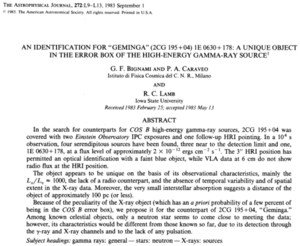Geminga: Difference between revisions
Ericmamajek (talk | contribs) (added source) |
|||
| (4 intermediate revisions by 2 users not shown) | |||
| Line 12: | Line 12: | ||
==IAU Star Name== |
==IAU Star Name== |
||
Name already in |
Name already in [https://simbad.u-strasbg.fr/simbad/sim-id?Ident=Geminga CDS-SIMBAD], and in the Wikipedia |
||
Wikipedia |
|||
WGSN registered this name in their IAU-Catalog of Star Names in 2022. |
|||
| Line 22: | Line 24: | ||
==Reference== |
==Reference== |
||
[[Category: |
[[Category:Star Name]] |
||
[[Category:Eurasia]] |
[[Category:Eurasia]] |
||
[[Category: |
[[Category:European]] |
||
[[Category:Modern]] |
|||
[[Category:IAU-Star Name]] |
|||
Latest revision as of 02:24, 27 October 2024
modern name for PSR B0633+17 Astrophysically important nearby pulsar – 1127 references. NASA ADS lists 844 publications with “Geminga” in abstract. Name listed in Lortet & Spite (1986) IAU dictionary of names.
Etymology and History
Geminga is an artificially invented term for the gamma-ray and X-ray pulsar discovered and named by Giovanni Bignani+ 1983, see footnote below. Bignami (1944-2017) was Italian physicist, later chairman of Italian Space Agency (2007-2008)
The authors explain the pun: "This source is in the constellation of Gemini and it is a gamma-ray source. Pronounced with both G's as in "get", the word means "does not exist" or "it's not there" in Milanese dialect.
Mythology
IAU Star Name
Name already in CDS-SIMBAD, and in the Wikipedia
WGSN registered this name in their IAU-Catalog of Star Names in 2022.
